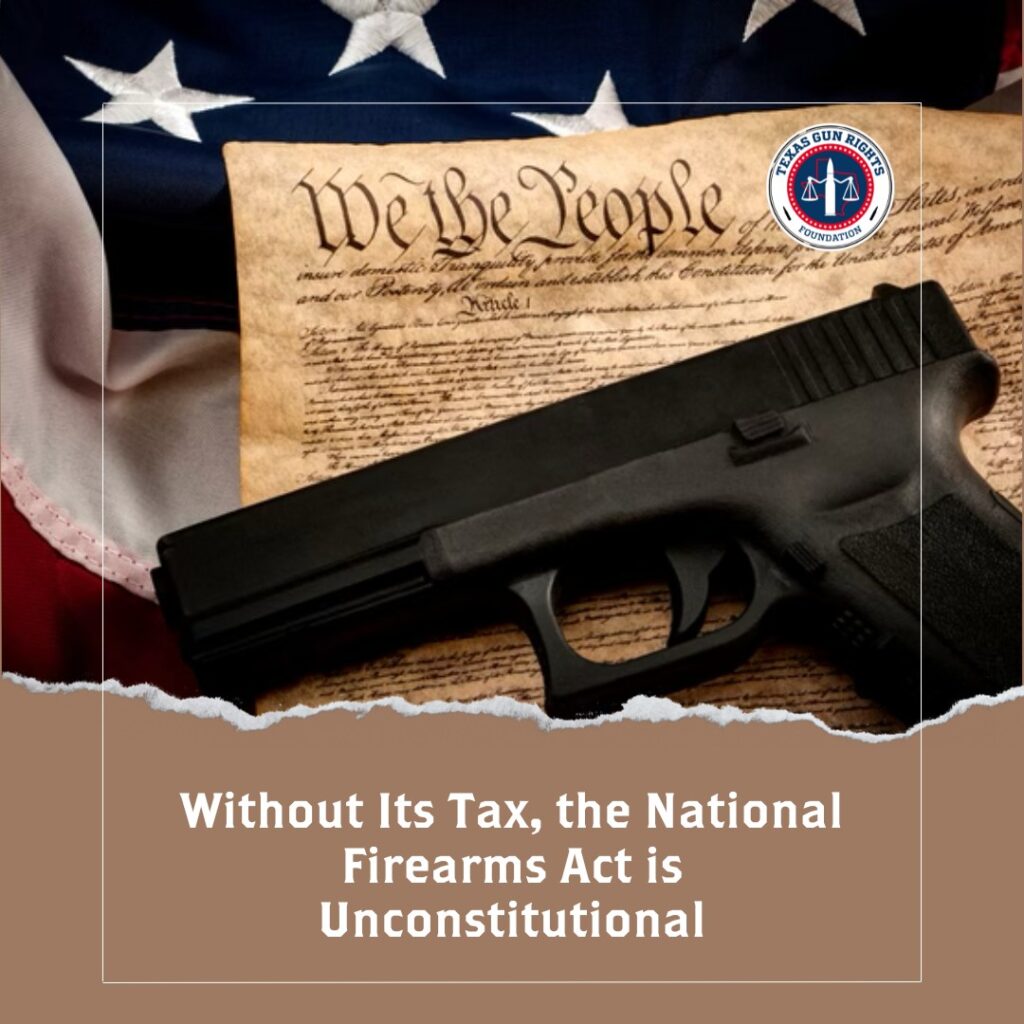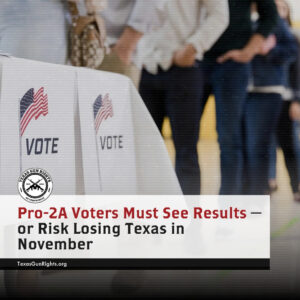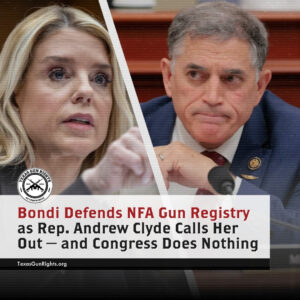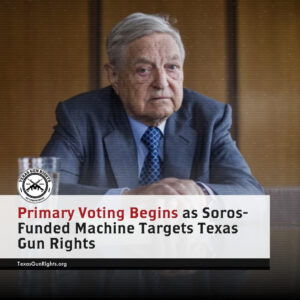When Congress enacted the National Firearms Act (NFA) in 1934, it was not a public-safety bill — it was a tax policy.
That’s not speculation or modern reinterpretation. It’s an uncontested historical fact, affirmed by both Congress and the Supreme Court.
The NFA was never sold to the American people as a gun control law. It was passed as “An Act to provide for the taxation of manufacturers, importers, and dealers in certain firearms.”
Its primary enforcement mechanism wasn’t criminal prohibition — it was taxation.
The law imposed a $200 tax (roughly $4,700 today) on the manufacture and transfer of certain firearms — namely machine guns, short-barreled rifles and shotguns, silencers (suppressors), and “any other weapons.”
The stated purpose? To use the taxing power to regulate behavior indirectly — something Congress otherwise had no authority to do at the time.
The NFA’s Constitutional Basis Was the Tax — Not the Regulation
In Sonzinsky v. United States (1937) and United States v. Miller (1939), the Supreme Court upheld the NFA’s constitutionality only because it was a tax.
The Court’s logic was clear: so long as a tax raises some revenue, Congress can impose it — even if it has a regulatory impact.
In other words, the federal government didn’t claim the power to ban or restrict firearm types. It claimed only the power to tax them. Without that tax, the constitutional justification for the NFA collapses entirely.
That’s why the current moment is so significant — and so revealing.
The Tax Is Gone. The Regulation Remains. That’s Unconstitutional.
When Congress passed the One Big Beautiful Bill earlier this year, it removed the $200 tax on suppressors, short-barreled rifles (SBRs), short-barreled shotguns (SBSs), and “any other weapons.”
Effective January 1, 2026, the NFA’s central revenue-raising provision for those categories — its entire legal foundation — is gone.
Machine guns and destructive devices still carry the $200 tax stamp, but for suppressors and short-barreled firearms — the very categories whose inclusion in the NFA has always been constitutionally suspect — Congress eliminated the tax entirely. Yet the registration and regulatory regime remains.
Gun owners must still register, apply, submit fingerprints, and wait months (or years) for bureaucratic approval before taking possession of an otherwise ordinary piece of hardware.
That is not taxation. That is unconstitutional regulation masquerading as taxation — something the Supreme Court specifically avoided endorsing when it first upheld the NFA nearly 90 years ago.
Why Were Short-Barreled Firearms and Suppressors Added to the NFA to Begin With?
In 1934, the Roosevelt Administration originally sought to ban handguns outright.
When that failed politically, short-barreled rifles and shotguns were added as a workaround — under the theory that criminals might saw off a long gun to make a concealable weapon.
Suppressors (often mislabeled “silencers”) were thrown in with almost no debate.
Early legislators worried they might be used by poachers during the Great Depression.
There was no serious data. No evidence. Just fear, politics, and a desperate government looking for revenue in the middle of an economic crisis.
Ninety years later, that legacy of panic has become the cornerstone of one of the most invasive federal databases in existence.
The Byrd Rule Betrayal
The One Big Beautiful Bill — a landmark pro-gun reform package that otherwise repealed large swaths of Biden-era gun control — was supposed to remove suppressors and short-barreled firearms from the NFA entirely.
But at the last moment, a Democrat Senate parliamentarian ruled that repealing the NFA’s registration requirements would violate the Byrd Rule, which limits what can be included in budget reconciliation bills.
The argument was absurd. The NFA was created as a tax — and taxes are precisely what the Byrd Rule exists to address.
If removing a tax regulation isn’t budget-related, what is?
Nonetheless, the parliamentarian’s ruling stood — and weak-kneed Republicans folded.
Cornyn’s Cave and the Swamp’s Celebration
Instead of challenging the ruling or fighting to restore constitutional logic, Senator John Cornyn and his establishment allies waved the white flag.
They celebrated the removal of the $200 tax as a “victory,” ignoring that the underlying regulatory regime — now stripped of its tax foundation — was left intact.
Even worse, the gun-rights establishment — Washington’s professional fundraising class — applauded the outcome.
They spun this as a “major pro-gun win,” when in truth, they created a constitutional crisis that will now cost American gun owners millions of dollars in legal fees to fix in court.
As Texas Gun Rights President Chris McNutt put it:
“We should not have to fight this in court. Congress should have done its job. But because weak-kneed Republicans caved to Democrats who lack both power and authority, gun owners are now being fleeced — not by the government, but by the very organizations that refused to fight when it mattered. They were too busy protecting their relationships with politicians to defend the Constitution. Texas Gun Rights will never work for a politician. We exist to protect the Second Amendment — and the gun owners who exercise it.”
The Courtroom Battle That Shouldn’t Exist
Because of that cowardice, we now face an expensive, unnecessary court fight.
The Gun Owners of America (GOA) has filed its “One Big Beautiful Lawsuit” in federal court, arguing that the NFA’s continued regulation of suppressors and short-barreled firearms is unconstitutional now that the tax is gone.
Their case — likely to reach the Fifth Circuit — argues that Congress cannot use the taxing power as a backdoor to regulate when the tax itself no longer exists.
The NFA’s registration system, enforced by the ATF, is now a pure regulatory regime, entirely disconnected from revenue.
Texas Gun Rights and the Texas Gun Rights Foundation are preparing to file an amicus brief in support of GOA’s case.
The goal: to start ripping apart the NFA piece by piece. McNutt’s position is unequivocal: “You shouldn’t have to beg permission to own a suppressor, or risk prison because your rifle barrel is half an inch too short. If the NFA was a tax — and the tax is gone — then the NFA is dead. Period.”
The Broader Constitutional Argument
Every court that has ever upheld the NFA did so under the taxing clause, not the commerce clause or any claimed general police power.
With the tax gone, the NFA now exists in a constitutional vacuum — a zombie law, stripped of the very mechanism that once justified its existence.
That’s why GOA’s lawsuit matters.
It doesn’t just challenge a rule; it challenges the intellectual and constitutional lie that federal bureaucrats can regulate away your rights under the guise of a tax that no longer exists.
If this lawsuit succeeds — and it should — it will set the stage for a wider dismantling of the federal gun control regime, including the Hughes Amendment’s 1986 machine-gun freeze, which also relies on an outdated NFA framework.
The Path Forward
Texas Gun Rights and its allies in the no-compromise movement are not waiting on permission from Washington to do what’s right.
They’re using every legal, legislative, and grassroots tool available to tear down the NFA brick by brick.
Gun owners deserve clarity, not compromise. The law should be simple: if you can lawfully own a firearm, you should be able to own a suppressor, a short-barreled rifle, or a short-barreled shotgun — without begging for government approval or paying for a permission slip that no longer even collects revenue.
The National Firearms Act was born in fear and sustained by falsehood.
Its only constitutional justification was taxation.
Now that the tax is gone, so too must the law be gone.
If politicians won’t finish the job, gun owners will — in the courts, in the legislatures, and at the ballot box.
As McNutt says: “The swamp didn’t win. They just bought themselves a little time. But Texas Gun Rights is coming for every unconstitutional gun law on the books — and we won’t stop until the NFA is where it belongs: in the ash heap of history.”







